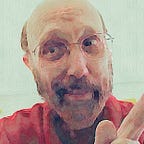A Confession: I Was Blind to My Victimhood
It took a hashtag-based serendipitous moment to tear the blinders from my eyes to reveal the Pity Party bias in my initial thoughts on the design of the proposed #GitHubCopilot for #DisabledDevelopers support program. Perhaps you’ll have seen it in the second article in this publication where I explored the potential composition of programming pairs in my envisioned program.
Truth be told, I try to be brave and confident facing the realities of diminished capacities due to my July 2020 devastating spinal cord injury. But it isn’t easy to keep on the sunny side of the street. I so wish I could time travel back to just before that moment when I stepped on the tail of one of our cats and fell in response to his guttural yowl. Back to avoid a moment that would change the trajectory of my and my wife Timlynn’s lives from that day onward.
Some days I just wish I could walk and use my hands like I had for the first seventy years of my life. I wish I was not saddling Timlynn with the burden of daily caregiving at a time when we should be coasting comfortably into our senior years. So it was the cognitive dissonance thrashing between these competing thoughts of stoicism and victimhood that made me miss the blind spot in my pair programming design.
I missed the scenarios where the disabled members of the proposed pairs were the helpful rather than the helpless.
I overlooked the case where two disabled developers could form a High Performance pair or where a disabled developer could mentor another disabled developer. It is interesting that I missed these two pair compositions while including the mentoring disabled developer paired with an able-bodied novice learner.
The reason I saw the one scenario while missing the others has its roots in that unexamined bias where I see myself as tragic victim of an accident that changed my and Timlynn’s lives. In the disabled mentor with able-bodied novice learner pair, the disabled member of the team was the needy one despite his, her, or their advanced knowledge contributed to the pair’s collaboration.
I missed seeing those programming pair compositions due to my reluctance to imagine the disabled developer as the capability enabler rather than always being the beneficiary of the pair’s synergy. I missed that the productivity enhancing power of GitHub Copilot could empower two disabled developers to supercharge their contribution to their chosen Digital Humanities, Citizen Science, or Open Source project. I missed that Copilot could enable a disabled developer to mentor another disabled developer.
The Hashtag #DisabledInSTEM Opened My Eyes to My Bias
In an effort to publicize this Medium publication, I made a series of tweets to my #DigitalHumanities and #AI/#ML (Machine-Learning) followers on Twitter. While composing tweets, the Twitter app tries to be helpful by making autocompleting suggestions as you type a hashtag. As I was entering #DisabledDevelopers a few times, I happened to notice the suggestion to complete my tag as #DisabledInSTEM. I knew that STEM was the acronym for the combined Science, Technology, Engineering, and Math domains. So I powered past the suggestion but spiked the idea to investigate that tag after completing my promotional tweets about this new publication.
When I did a search in my Twitter app to check out the #DisabledInSTEM hashtag, I was led immediately to the @DisabledStem account of Alyssa Paparella, a disabled STEMmer and NSF GRFP Fellow at the prestigious Baylor College of Medicine. I was amazed to see Alyssa had over 5,400 Twitter followers, so I followed the link to her DisabledInSTEM blog to learn more. Having fallen down Alyssa’s wonderful rabbit hole of inspiration I was thrilled to find a cache of Twitter accounts and websites for and by disabled Kindred Spirits that will undoubtedly help and inform my efforts to launch the #GitHubCopilot for #DisabledDevelopers support program.
So if there is a Life Lesson to learn in my recent experience, it is not to lose confidence in yourself or wander too long on the shady side of the street. Despite your life challenges, where there is a will there will be a way. For me on this Friday morning, I will be sailing into the weekend buoyed by the knowledge that I am one among a myriad of people learning to overcome our disabilities by recognizing and exercising our abilities.
Happy Healthy Vibes from Colorado USA,
— Jim —
Jim Salmons is a seventy-one year old post-cancer Digital Humanities Citizen Scientist. His primary research is focused on the development of a Ground Truth Storage format providing an integrated complex document structure and content depiction model for the study of digitized collections of print era magazines and newspapers. A July 2020 fall at home resulted in a severe spinal cord injury that has dramatically compromised his manual dexterity and mobility.
Jim was fortunate to be provided access to the GitHub Copilot Technology Early Access Community during his initial efforts to get back to work on the Python-based tool development activities of his primary research interest. Upon experiencing the dramatic positive impact of GitHub Copilot on his own development productivity, he became passionately interested in designing a research and support program to investigate and document the use of this innovative programming assistive technology for use by disabled developers.
